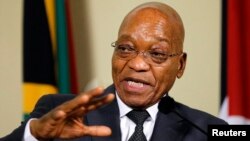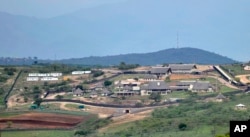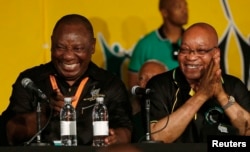South Africa’s leading opposition party has issued a scathing end-of-year government assessment, accusing top officials in the ruling party of failing the nation amid a rising tide of corruption allegations.
The African National Congress has dismissed the so-called report card as "too ridiculously subjective, illogical and flawed for anyone to take seriously."
The Democratic Alliance’s report card is the latest salvo in an increasingly bitter battle of words between political parties that in recent weeks has degenerated into actual fistfights in Parliament. ANC critics not only include the staid and established DA, but also the upstart, far-left Economic Freedom Fighters party – and a growing number of South African voters.
Zuma’s failing grade
In the report card issued December 1, the DA gave President Jacob Zuma a grade of one out of 10. That poor mark comes from several factors, party representatives say.
They accuse Zuma of:
- Failing to meet his legal commitment to answer questions before Parliament quarterly;
- Failing to improve South Africa’s economy;
- Failing to curb fraud and corruption that lead to annual government losses of approximately 30 billion rand or almost $2.6 billion;
- Dodging accountability over his alleged use of state funds to upgrade his personal home;
- Making a "secret deal" with Russia to build a new nuclear power plant;
- Failing to fix a raging energy crisis that has caused rolling blackouts in urban areas;
- Politicizing various state agencies to his own ends.
"It is clear," the DA said in a statement, "that this is the worst performance yet by the president."
Many in Zuma’s cabinet fared just as poorly, according to the DA. Its representatives gave low grades to the ministers of communications, economic development, energy, labor, water and sanitation, and sport and recreation. The last, the report said, "has spent most of his time making ridiculous statements."
The ANC was quick to reject the report card. "We dismiss this cheap publicity stunt with the contempt it deserves," the office of the party’s chief whip said in a statement.
The party, noting the DA is not an official ratings entity, accused it of lacking political objectivity.
The ANC statement said: "As an opposition, the job of the DA has been simply to oppose. That it habitually elects to do so through endless charades and gimmicks, as this meaningless annual ritual attests, is illustrative of the bankruptcy of ideas and political strategy within its ranks."
Corruption loomed
However, 2014 was a year in which the issue of corruption rather than ideas dominated the public discourse. The most notable case focused on questions about the $23 million spent on security and other upgrades to Zuma’s personal Nkandla homestead.
The ANC has rigorously defended Zuma since Public Protector Thuli Madonsela, in her constitutional role, issued a report earlier this year concluding public funds were misused on personal upgrades and recommending the president repay a portion of those costs.
Zuma did not respond directly to the report and later refused to answer lawmakers’ questions on the matter. In the end, an ANC-led parliamentary committee cleared him of all responsibility. But the Nkandla affair has further embittered the political divide.
Threats from the left
Despite mounting allegations of corruption at all levels of government, the ANC – which has dominated every national poll since South Africa’s democratic transition in 1994 – again scored big in the May 7 national election, winning with more than 60 percent of the vote.
But this past election did foreshadow that the ANC’s mass appeal may soon wane, as the party’s majority slipped by 3 percent in the face of emerging threats from the political far left.
The biggest surprise came from a party that was less than a year old at the time. The bold and brash Economic Freedom Fighters was formed from the ashes of the political career of an expelled ANC firebrand, Julius Malema. The party became the unlikely kingmaker when it took third place in May’s elections after appealing to South Africa’s angry youth. And the EFF’s governing style reflects the mood of those supporters, who prefer confrontation to discourse.
The EFF legislators entered Parliament wearing bright red workers’ uniforms in a highly symbolic reference to the manual laborers they represent.
In August, the EFF sparked a parliamentary outburst when its lawmakers loudly challenged Zuma over the Nkandla affair. Then in November, the EFF was joined by DA legislators in again loudly challenging the president over corruption allegations. That session devolved to hurling insults and prompted the speaker to call riot police into the chamber. Physical fights ensued.
No remorse
The EFF is unapologetic.
"The EFF reiterates that it shall never apologize for asking Jacob Zuma as to when is he paying back the money,” the party said in a statement. "Furthermore, the EFF remains very proud of its MPs for restoring teeth to parliamentary executive oversight."
The ministers may get a few extra teeth in the coming year. The nation’s largest trade federation – a key ally of the ANC – recently expelled the National Union of Metalworkers of South Africa over its criticisms of the ANC. The union has in turn hinted at its ambitions to start its own socialist-leaning party at its March committee meeting.
And there are signs of an unlikely alliance between the DA and the EFF, whose very different politics converge in only one spot: their criticism of the ANC.
Mabine Seabe, the DA parliamentary spokesman, laughed when asked by VOA News if the EFF was "the DA’s new BFF."
"We’ve essentially come together as like-minded opposition parties to say our constitution is at stake here," he said.
Threats from far and near
Whatever happens, the ANC is in for a tough 2015.
"Parliament’s doors may have closed for the year, but next year is another year in which we will fight, with even more gusto, to ensure that President Zuma answers and accounts for his plethora of scandals," DA Parliamentary leader Mmusi Maimane said in an editorial column.
But DA representatives also noted that not every ANC minister was, in their eyes, a disappointment. They gave high marks – of eight out of 10 – to Naledi Pandor, science and technology minister, praising her good management and clear strategy.
They also gave Zuma’s deputy, Cyril Ramaphosa, a mark of five out of 10 – a great score, considering that South African schools consider 40 percent a "pass." The business magnate-turned-politician has long been rumored of planning, either on his own or with ANC support, to take the reins before Zuma’s second term ends.
But the ultimate grade will come from the voters, who will have their next chance to weigh in via local elections in 2016.






